China Super League: Fantasy football or the next world power?
- Published
The rise of the Chinese Super League
The new Chinese Super League season starts this weekend after a winter transfer spend of £200m, which eclipsed all of Europe's major leagues.
Big-name signings such as Alex Teixeira, Jackson Martinez and Ramires are among the overseas stars who will be on show.
The influx of money and famous names is tied into the grand plan of the country's president, Xi Jinping - a football enthusiast - to win the World Cup in 15 years.
Is China playing its own game of fantasy football, or can it really become the game's dominant nation?
Chinese Super League - what you need to know
A numbers game... | ||
|---|---|---|
16 teams | Almost 500 players | 18% of players from overseas |
Average age of players: 26.5 years | Estimated total transfer value of players: £268m | 5.3 million fans attended games last season |
Each team is allowed five foreign players, including one from an Asian Football Confederation country, such as Australia, Japan or Hong Kong.
Only four overseas players are allowed on the pitch at the same time.
No overseas goalkeepers allowed - to improve home-grown quality.
No cap on spending, no maximum wage and no European Financial Fair Play (FFP) equivalent.
Jiangsu Suning set a new Chinese transfer fee record in February, signing Brazil midfielder Alex Teixeira from Shakhtar Donetsk for £37.5m.
Average stadium capacity is 45,268 and the average crowd for last season was 22,193.
The 2015 'most valuable player' was Brazilian midfielder Ricardo Goulart of Guangzhou Evergrande.
The league went professional in 1994 and became the Chinese Super League in 2004.
The season runs from March to November.
The big deals
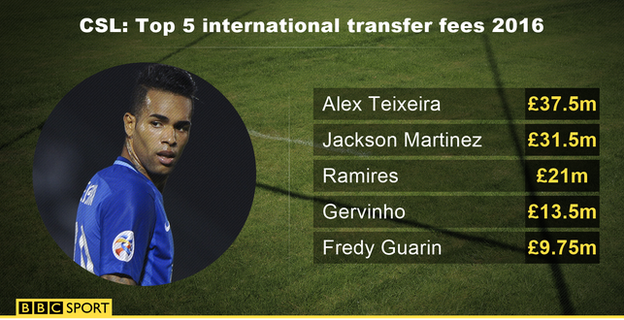
Source: transfermarkt.co.uk
Argentina forward Ezequiel Lavezzi was the most recent big name to move to China, joining Hebei China Fortune on a two-year deal earning the 30-year-old a reported £400,000 a week.
Jiangsu Suning paid almost £60m for Brazilian midfield pair Teixeira and Ramires, while Martinez made a £31m move to Guangzhou Evergrande from Atletico Madrid.
Even second-tier clubs are raiding Europe, with former West Ham forward Nikica Jelavic at Beijing Renhe.

Ex-Chelsea and Newcastle striker Demba Ba, former Arsenal man Gervinho, ex-Everton captain Tim Cahill and ex-Sunderland striker Asamoah Gyan have all moved to China in the past year
Zhuang Chen, digital editor, BBC East Asia |
|---|
"The biggest factor is money. For some of the players, they don't even know where the club is located. They have to check on the internet." |

Former Chelsea boss Luiz Felipe Scolari, ex-Tottenham goalkeeper Ian Walker, former Chelsea full-back Dan Petrescu and ex-England manager Sven-Goran Eriksson are all working in the Chinese Super League
The Chinese transfer fee was broken four times in a month recently. How long until the world record is surpassed?
"China has fallen in love with breaking world records," says Simon Chadwick, professor of sports enterprise at Salford University. "It is symptomatic of the Chinese culture.
"They are conspicuous consumers who love to be seen to be the best and love to flaunt their wealth.
"A Chinese entrepreneur and their club will want to be able to say they have set a new world football transfer record and I predict that within 12 months that will happen."
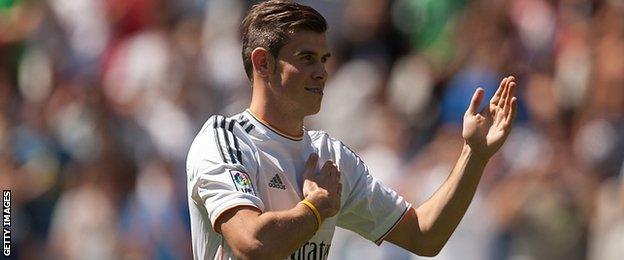
Gareth Bale is the world's most expensive footballer, signing for Real Madrid from Tottenham for £85m in 2013
The president's grand plan
President Xi's 10-year plan - running from 2015-2025 - is to create a Chinese sports economy worth $850bn (£609m). Optimistic estimates value the entire global sports economy at about $400bn (£286bn).
He wants to build 20,000 football schools by 2017, producing 100,000 players, and increase schools to 50,000 by 2025.
President Xi wants China to host and win the World Cup in the next 15 years.
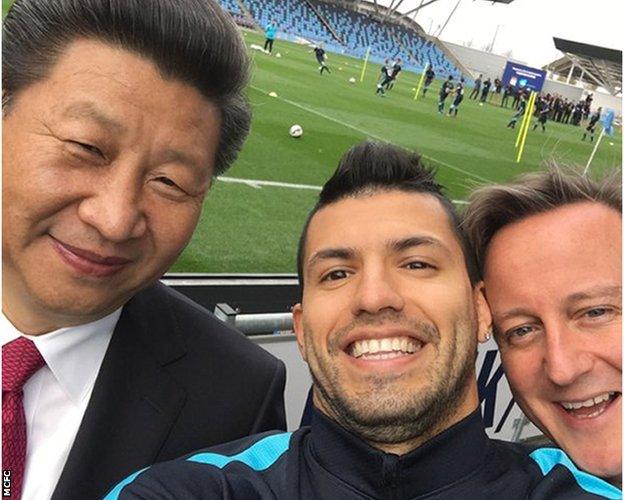
Manchester City's Sergio Aguero with President Xi and British Prime Minister David Cameron during the Chinese leader's state visit in October 2015
"Ten years ahead, 15 years ahead, I am quite sure the China national team will compete to win the World Cup," says Shanghai SIPG boss Sven-Goran Eriksson.
The much-travelled Swedish manager led his side to the runners-up spot last season. Although "shocked" at the amount of money spent in the transfer window, the 68-year-old told BBC World Service the CSL has moved away from the perception of another well-paid destination for semi-retired stars.
Having managed in Serie A in the 1990s and the English top flight in the 2000s, Eriksson says "everyone should be worried" about the emergence of the Chinese Super League.
"The money is here and the football is getting better. I think attitudes have changed," said Eriksson. "This is reality for a long time.
"They realised they weren't on the level in world club football and they want to reach it. China will soon be a world power in football."
China usually achieves its aims, says Chadwick. The country has excelled at the Olympics and Paralympics, yet has only ever qualified for one football World Cup - in 2002.
The Premier League in China | |
|---|---|
Premier League matches available free on IPTV, online, plus two matches per weekend on state TV. This is via a six-year rights deal from 2013-2019. | Premier League coaches go into schools to work with Chinese PE teachers. |
Premier League has worked with Chinese FA to advise on CSL. | Premier League has Chinese language Weibo and WeChat social media accounts. |
How much improvement is needed?
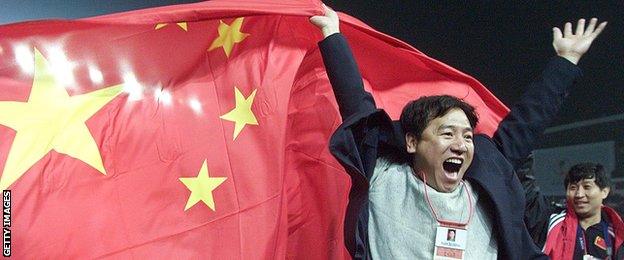
China qualified for the 2002 World Cup in Japan and South Korea, but lost all three group games, conceding nine goals and scoring none
"There are national branding issues," added Chadwick. "It is about profile, image, reputation and prestige, yet China is not particularly good at football and that rankles."
China - 96th in the world rankings - may not qualify for Russia 2018. They are third in their group behind Hong Kong and Qatar, with only the top two going through to the next round of qualifying.
Short-term goals include being able to boast 'the best club side in the world'.
That could soon be Luiz Felipe Scolari's Guangzhou Evergrande. They have won the CSL five times in a row and are the only Chinese club to win the AFC Champions League twice, in 2013 and 2015. That gave them entry to the prestigious Fifa Club World Cup - which they were knocked out of by eventual champions Barcelona.
What do the players think?
'It's about more than the millions'
"I want to know about life. I want to know things and travel the world. I have the possibility of doing this while I'm playing football," Demba Ba told BBC Sportsworld when asked why he had joined Shanghai Shenhua.
But the Senegalese former Newcastle and Chelsea striker, 30, admits it will take "years and years" to bring the CSL up to the standard of Europe's best.
"It's not about how many millions you spend, it's much more than this," he said. "The Chinese have got to take their time."
Discussing the appeal of the Chinese game, Liverpool defender Kolo Toure, 35, was also pragmatic, saying: "This is the power of the money. For this market to open to football is great.
"We're playing for the love of the game but at the same time it's our job."

New Changchun Yatai signing Jack Sealy (left) is excited by having a "proper league and atmosphere" to play in
Southampton-born Hong Kong international Jack Sealy has signed for Super League side Changchun Yatai from the Hong Kong national league, where he was playing in front of fewer than 5,000 people.
The 28-year-old defender told BBC World Service: "The top teams in the league like Guangzhou Evergrande and Shanghai SIPG would fare quite well at the top of the Championship, maybe even the Premier League. The rest would be Championship and below.
"The signings have definitely raised the profile. I've only been with my team for a month and every day my friends are messaging me saying: 'Have you seen this new signing?'"
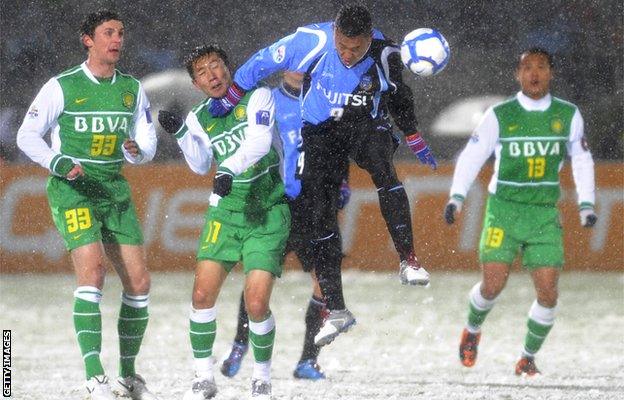
Maurice Ross (left) in Asian Champions League action for Beijing Guoan - "The sheer size of China meant we flew to every game"
'It's not a great place to play football'
Former Rangers defender Maurice Ross, now manager of Norwegian side Egersunds IK, is one of the few British players to have played in China.
Ross said he signed for Beijing Guoan for financial reasons and described the league as a "false set-up" with a "lack of professionalism".
He described "clueless" double training sessions in 40C heat with no shape or structure, and insisted China will "never" catch up with the Premier League's global appeal.
"So many deals are short-term because of the environment," said the Scot. "You must really adapt to their lifestyle and not many can. It's not a great place to play football."
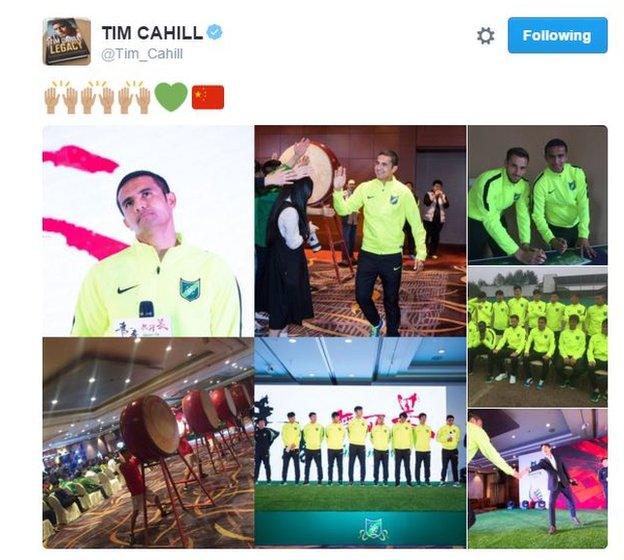
Tim Cahill is welcomed to new club Hangzhou Greentown after his contract was terminated by Shanghai Shenhua - a decision he called "heartbreaking"
Last month, former Everton midfielder Tim Cahill described the CSL as "crazy" and "like a revolving door".
The Australia international was critical of players moving purely for "personal gains". Shortly after his comments to Fox Sports Australia,, external Cahill left Shanghai Shenhua, before joining Hangzhou Greentown.
The 36-year-old admitted the constant transfer activity would boost China's profile, but added: "With this investment in the players, there's a Catch-22. Does it help the Chinese? To a certain extent, no.
"The most difficult area for the Chinese national team is attacking - they can't score goals. Everything else, they're technically gifted, they're great. I've spent a year with these kids."
The coach's view
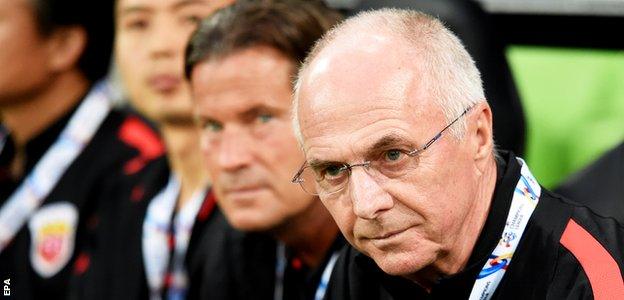
Sven-Goran Eriksson and Mads Davidsen on the bench for Shanghai SIPG
"People think it's easy to play in China," says Shanghai SIPG's head of recruitment Mads Davidsen. "You come here, earn a lot of money and take it easy. That is a massive misunderstanding.
"You see players who are here for four or five months and they'll be changed in the next transfer window if they aren't performing enough," said the Dane, who is Eriksson's assistant. "There's no patience in China as you can only have four foreigners. The expectations are almost unrealistic."
Although Eriksson believes China will soon be able to attract the biggest names in world football, Davidsen is less certain, describing the outlay as "significant, but just another step in the development".
"I don't think we'll ever be able to buy the best players in the world in their best age," he said. "But we are now buying second and third best players in their positions.
"We have been offered players from the highest level in the Premier League and the Bundesliga. This tells me China has moved into another market now."

Where is the money coming from?
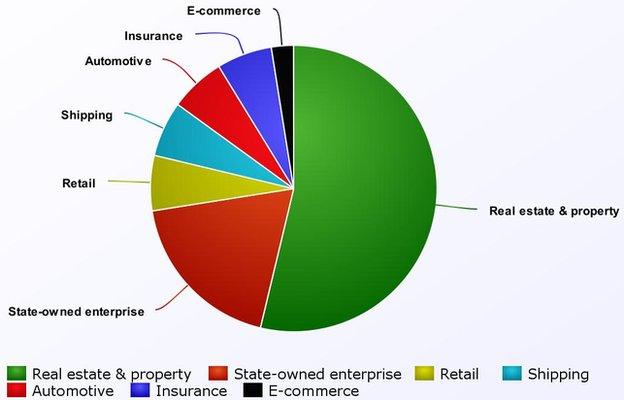
All 16 CSL clubs are owned by businesses (Source: Simon Chadwick, professor of sports enterprise at Salford University)
A lack of financial transparency means it is difficult to know how much is being spent by the Chinese government towards Xi's grand plan.
Regional governments are contributing towards the $850bn vision, while state-backed organisations such as China Media Capital (CMC) - which took a 13% stake worth £265m in Manchester City in December - are also making strides.
"In China there is a cultural phenomenon called 'guanxi'," explains Chadwick. "It can be described in different ways, but is essentially an 'I'll scratch your back, you scratch mine' approach to doing business.
"A property developer looking to build a block of flats, for example, can gain planning permission leverage if they are seen to be promoting state policy on investing in sport, maybe by buying shares in a football club.

Chart shows overseas players bought by Chinese teams; Chinese businesses investing in overseas clubs; and Chinese businesses investing in other sports-related overseas companies. (Source: Professor Simon Chadwick)
"Since this century began, China has had two footballing revolutions. It's now on a third," explains Chadwick.
"The first was in early 2000s when they qualified for the World Cup, but they did incredibly badly and that fizzled away.
"The second was three or four years ago with the vanity purchases of players like Nicolas Anelka and Didier Drogba, essentially driven by the conscious consumption of incredibly wealthy owners. That one, too, disappointed.
"We're now into a third revolution, but this is very different. It is a presidential - and therefore state - decree. And you've got super-rich entrepreneurs leading the charge."
China's 'entrepreneurial lieutenants' investing in football | Source: Forbes |
|---|---|
Wang Jianlin, 61, chairman of Dalian Wanda Group | Jack Ma, 51, executive chairman of Alibaba Group, external |
Worth: £20.2bn - China's richest man | Worth: £15.4bn - China's second richest man |
Bought 20% of Atletico Madrid for £34m in 2015. Bought Swiss sports-marketing company Infront Sports & Media for £889m. | Bought 40% of CSL and Asian Champions League winners Guangzhou Evergrande for £137m in 2015. |
Will the bubble burst?

Chinese champions Evergrande run an international football school with more than 50 pitches and 2,400 students, said to be the largest in the world. It has a 15ft World Cup replica at the entrance
Xi, elected in 2013 on a 10-year tenure, wants to leave a legacy. He has put football on the school curriculum to try to make future national sides world class.
His corruption purges on the domestic game's widespread match-fixing problem have resulted in hundreds of arrests in a country with a deep-rooted gambling culture.
Significant socio-cultural barriers also need addressing. Chinese parents do not see football as a profession and - in a nation becoming less physically active - want their children to pursue other career options.
"One of the reasons Xi is so interested in Manchester City is its campus concept, where you get an education but play sport at the same time," explains Chadwick.
Former Denmark, Brondby and Schalke striker Ebbe Sand runs a private football academy in Shanghai and says China must focus on improving facilities to develop grassroots football and their own coaching structure.
"It's not just about population," Sand told BBC Sportsworld. "The big difference between Europe and China is there aren't many pitches. I'm from a small village in Denmark and even a small village has 11-a-side pitches. This is a 10-year programme."
China's investments in European clubs will also enable it to "acquire competence and knowledge" in coaching future generations of domestic players, writes BBC News business reporter Bill Wilson.
And as part of Chinese LED light manufacturer Ledman's sponsorship of the Portuguese second division, young Chinese players will be placed in several clubs.
"A lot of this is Xi-dependent," claims Chadwick. "There has to be some doubt about how long his football strategy can be sustained.
"It didn't work with basketball in a basketball country, and there has to be a concern that if China isn't seen to be making strides, will the political elite just go cold on the idea?"
Can China's 'soft power' win a World Cup bid? |
|---|
"China is very smart at using football as a means of exerting political influence around the world" - Chadwick. |
'Stadium diplomacy' programme has built free Chinese-funded stadiums, external throughout Africa, the Caribbean and the South Pacific Islands. |
China's richest man now owns football rights bidding specialists Infront- run by Philippe Blatter, nephew of ex-Fifa president Sepp. |
Fan engagement
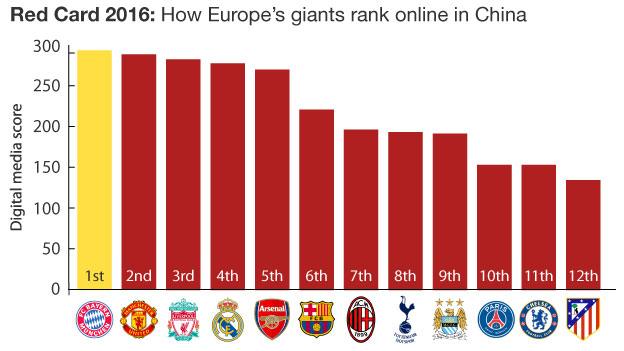
Buoyed by their own and Germany's recent triumphs, Bayern Munich score highly in China for fan engagement but Manchester United and Liverpool are not far behind
CMC has paid $1.3bn (£900m) for a new five-year deal for global, all-media rights to the Chinese Super League from this season.
Last season clubs collected just $9m (£6.4m) from broadcasters.
There are no immediate plans to charge viewers to watch CSL and little demand from overseas.
CMC will use access to exploit huge demand for social media content on platforms such as WeChat and Weibo - the Chinese Twitter.
Games have an average attendance of 22,193 - on par with Italy and France, but behind Spain, England and Germany.
More than half of top-flight stadiums have a capacity of 50,000 or more, but are often half-full. There are passionate local fans, but clubs will need to attract new "fickle" supporters to build a fan culture and make any sort of financial returns, says Tori Widdowson, a marketing consultant who runs sports events in China
"As for the die-hard fans", adds Widdowson, "they lost hope in CSL years ago. They see the money being thrown at it now, are even more cynical and are happy to keep watching European leagues in particular."
"Chinese fans need icons, the fan culture there needs individual heroes," says Chadwick. "The star players are not vanity purchases, they are used to raise the standard of play, to teach the Chinese players and to become a point of fan engagement to get people into the stadiums."
Arsenal boss Arsene Wenger on the CSL's spending power |
|---|
"Will they sustain their desire to do it? Let's remember, Japan started to do it a few years ago but slowed down. If it is a very strong political desire, we should worry." |
What do the supporters think?
BBC Sport asked Chinese football fans what they think of their national league:
Yu Zujiang: "Nowadays I tend to follow Guangzhou Evergrande, because this team often wins the title. Internationally I follow the European Champions League the most. I like Manchester United and I also like players like Lionel Messi.
"The majority of fans don't go to the games to cheer them on, they'll happily watch on TV or the internet.
"There aren't many knowledgeable pundits, and there aren't many people that play football regularly. Even less are those that would expect to make a living out of football. There's also a scarcity of people who watch football just for the love of it."
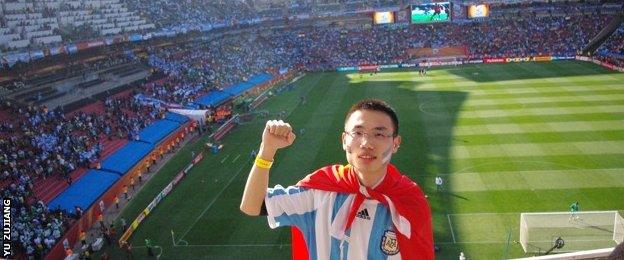
Yu Zujiang says he has only ever seen one World Cup game - Argentina v Nigeria in 2010 - and has never seen a CSL match live
Shi Linqi: "As a die-hard footy fan it's hard to even answer questions about it - in a word, Chinese football stinks. I watch the international leagues, but the domestic scene I haven't followed for years, I can't bear it.
"The money that's been spent on the game, will it improve the football?
"Many fans will get excited about it for a few years and then it will drop off again, as before.
"The development of a few wealthy and influential clubs in China says nothing about the whole of football here."
LeShi Sports football pundit Dong Li: "For the nurturing of a football culture and the improvement of the whole of China's football environment, all of the investors in this area need to work hard together. It's critical that people build it up, not tear it down."
- Published5 February 2016
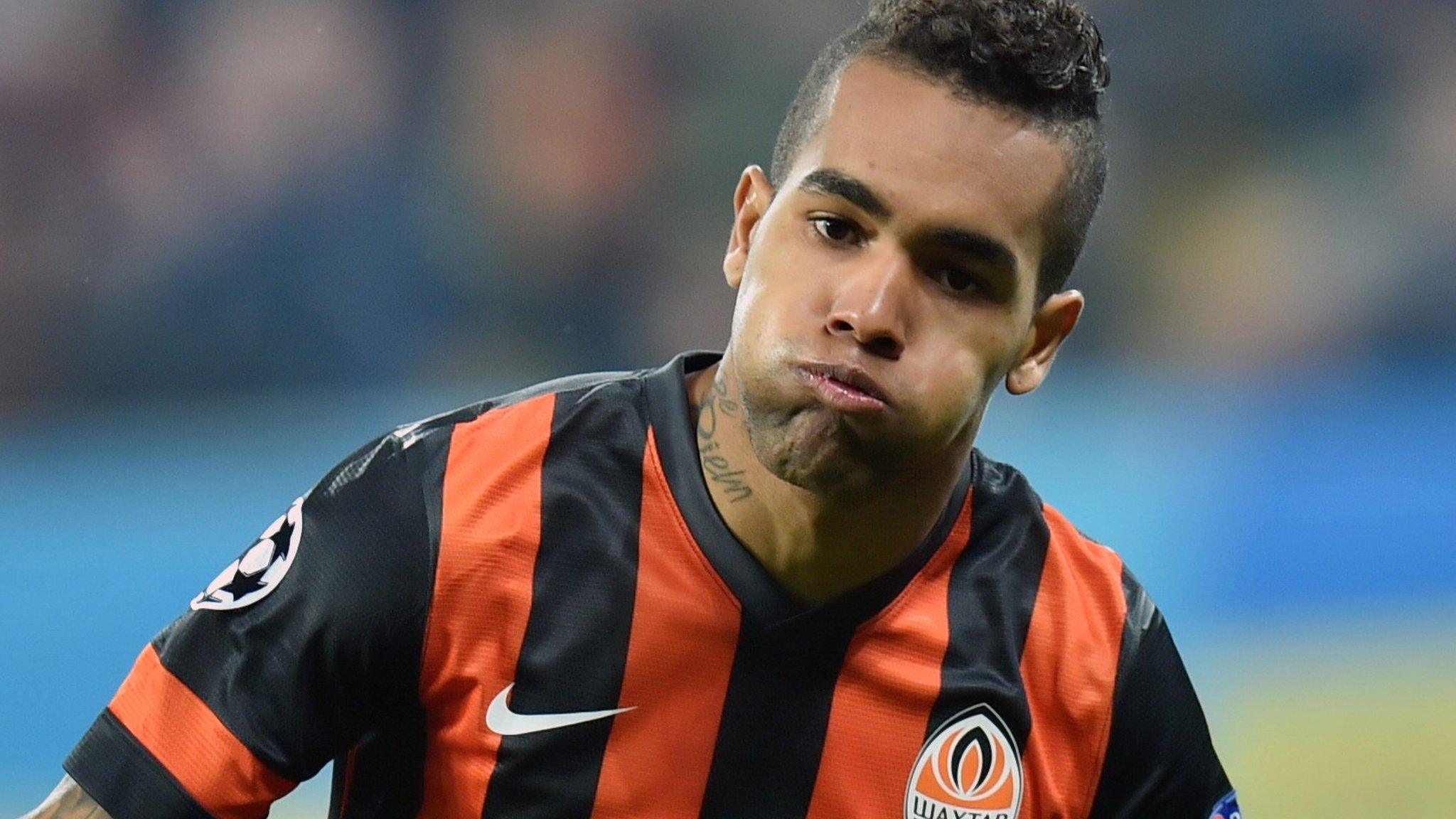
- Attribution
- Published14 December 2015
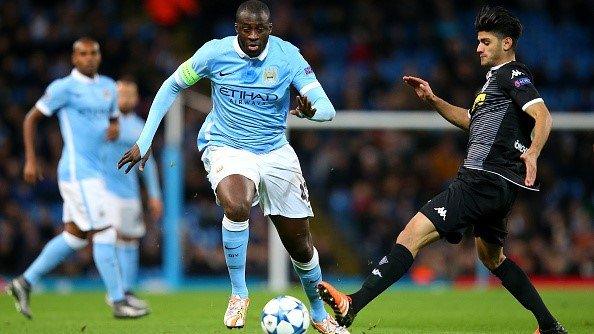
- Attribution
- Published26 January 2016
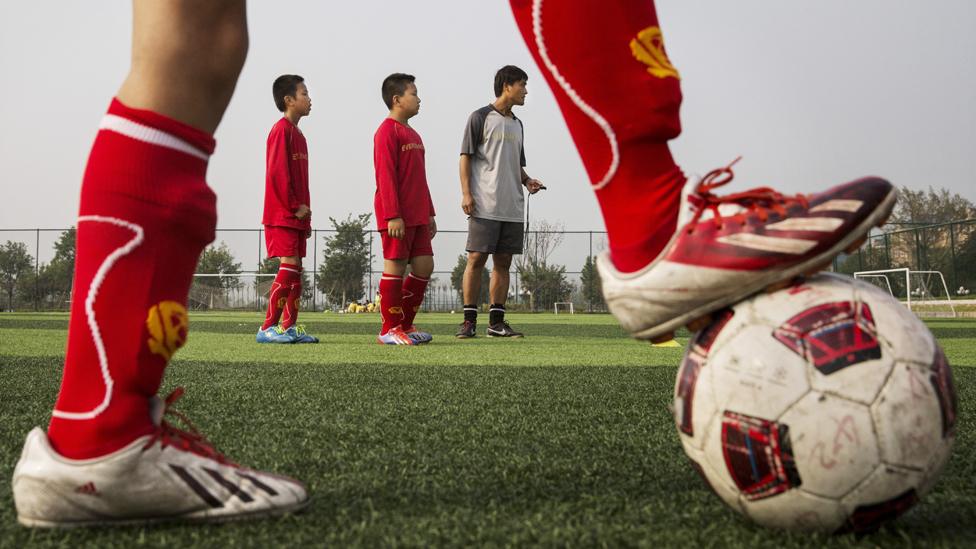
- Published3 February 2016
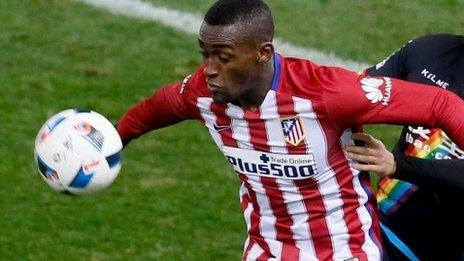
- Published20 June 2016

- Published7 June 2019

- Published2 November 2018
